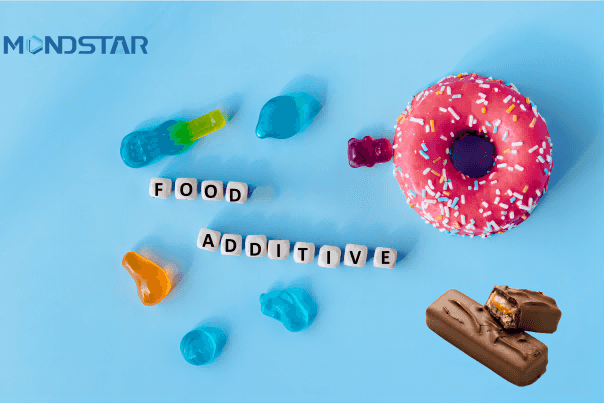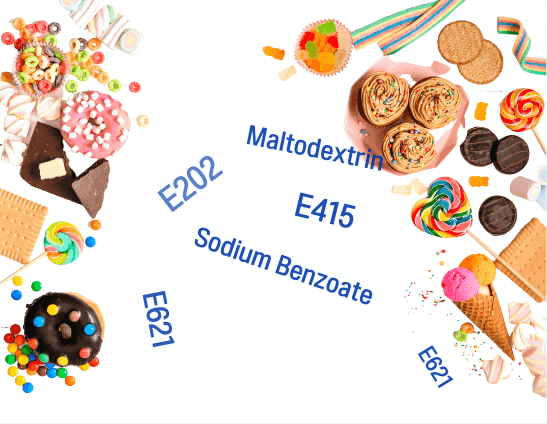Food Additives Buying Guide
Additives are key players in keeping our food safe, tasty, and lasting longer. Yet, figuring out which ones to use is a real head-scratcher.
We’ve put together this guide to take you from zero to hero on food additives. You’ll get to learn everything from what these additives are, navigating through rules and regulations, to picking out the best ones. We’ll even teach you how to spot trends and team up with suppliers smartly. By the end of this guide, wholesalers and distributors like you will be making choices in the food additive world like pros.
- The Importance of Food Additives
- Why This Guide is Important for Food Additive Wholesalers and Distributors?
- Basic Knowledge of Food Additives
- Food Additives Regulations and Standards
- Selecting the Right Food Additives
- Food Additives Market Trends and Analysis
- Supplier Selection and Collaboration Strategies
- Case Studies and Success Stories in the Food Additives Industry
- Conclusion:

The Importance of Food Additives
In the food prep and production world, food additives are extremely important. They’re all about keeping your meals safe, delicious, and looking good for longer. Whether it’s locking in that fresh taste, boosting flavors, or making textures just right – these additions are crucial. They let us make an array of tasty and nutritious options that are in line with what people want worldwide. In an industry where being inventive and consistent counts for everything, food additives are the secret ingredient for success.
Why This Guide is Important for Food Additive Wholesalers and Distributors?
Wholesalers and distributors need to know the specifics of food additives, and here’s why. Mondstar has put together this guide to fill you in on everything about food additives. It’s your go-to for navigating this tricky market.
- Make Smart Choices: Knowing all there is about food additives—what they are, what they do, and where they fit in—helps you choose products that people want and need.
- Follow the Rules: You’ve got to keep up with the latest laws and regulations. This guide lays out what you need to know to make sure your products meet regional and international laws.
- Stay Ahead of the Game: Keeping an eye on what’s happening now and what might happen next in the market keeps you competitive. We’ve packed our guide with an analysis of market trends so you can plan for the future.
- Ensure Quality: Figuring out how to check additive quality and its effects on your final product means happier customers at the end of the day.
- Pick Your Partners Wisely: Finding suppliers you can trust is key. We provide tips on evaluating suppliers to build lasting, win-win relationships.
This purchasing guide isn’t just another document—it’s your path forward in the bustling world of food service. Whether it’s expanding your offerings, sticking to the rules, or getting ahead of competitors, Mondstar has your back every step of the way.
Basic Knowledge of Food Additives
Let’s get a clear picture of what food additives are and what are their types. This part, along with the more detailed guides that follow, will give you a complete understanding of food additives.
Definition and Categories
Food additives are things we add to food to keep it safe, fresh, tasty, textured, or looking good. These are the different kinds of food additives and what they do:
Preservatives: These additives, like Sodium Benzoate and Potassium Sorbate, fight off microbes that spoil food. They’re key in making food last longer, which is super important in the global food supply chain today.
Antioxidants: Ascorbic Acid, Sodium Erythorbate, Sodium Sulfite: These stop fats and oils from going bad due to air exposure. They keep the flavor and nutrition intact.
Acidulants: Stuff like Citric Acid and Lactic Acid tweak the acidity and pH level of food. They’re about keeping food safe while also making it taste better.
Leavening Agents: Calcium Carbonate, Ammonium Bicarbonate, Sodium Bicarbonate: You’ll find these in baked goods where they create gaseous bubbles that make everything light and fluffy.
Emulsifiers: Propylene Glycol, Glyceryl Monostearate, and Polysorbate: These mix oil and water for smoother textures in foods like dressings or creams.
Sweeteners: Aspartame, Acesulfame Potassium, Sucralose: They sweeten stuff without adding calories—for example, diet sodas or low-cal snacks.
Thickeners and Stabilizers: Xanthan Gum, Sodium Alginate; Gellan Gum: They make sauces thick or stabilize mixed ingredients so everything holds together nicely.
Phosphates: Sodium Tripolyphosphate (STPP) and sodium Acid Pyrophosphate (SAPP): These enhance texture in processed meats and dairy stuff by acting as buffers.
Enzyme Preparations: Alkaline Protease; Neutral Protease; Lipase: These help with cheese making or baking by breaking down proteins or fats.
So there you have it—the basics of what’s added to your food to keep it deliciously edible!

Common Food Additives List and Their Usages
Now let’s explore what specific food additives do to improve our food quality. Here are some common ones you’ll find and what they’re for:
Sodium Benzoate: It keeps acidic foods like salad dressings, fizzy drinks, and pickles safe from bacteria and fungi.
For more information, please visit our Sodium Benzoate Buying Guide
Calcium Propionate: You’ll see this in baked goods because it stops mold and bacteria from growing.
For more information, please visit our Calcium Propionate Buying Guide
Potassium Sorbate: This one keeps cheeses, wines, and bakery items fresh longer by blocking mold, yeast, and fungi.
For more information, please visit our Potassium Sorbate Buying Guide
Ascorbic Acid (Vitamin C): More than an antioxidant, it also maintains the color and nutritional goodness of fruits and veggies.
For more information, please visit our Ascorbic Acid (Vitamin C) Buying Guide
Sodium Erythorbate: Keeps meats looking fresh and blocks nasty nitrosamines from forming.
For more information, please visit our Sodium Erythorbate Buying Guide
Ammonium Bicarbonate: A baker’s friend that makes dough rise by releasing carbon dioxide.
For more information, please visit our Ammonium Bicarbonate Buying Guide
Glyceryl Monostearate: Found in bread, ice cream, and gum to make sure oil doesn’t separate from water.
For more information, please visit our Glyceryl Monostearate Buying Guide
Lecithin: Makes chocolate and baked goods smooth and consistent.
For more information, please visit our Lecithin Buying Guide
Malic Acid: Boosts flavor while keeping the pH level just right in fruit-based products and drinks.
For more information, please visit our Malic Acid Buying Guide
Citric Acid: Adds flavor to drinks, canned veggies, and frozen fruits while keeping their pH level balanced.
For more information, please visit our Citric Acid Buying Guide
Sodium Saccharin: Give your diet soda or sugar-free gum a sweet kick without the calories.
For more information, please visit our Sodium Saccharin Buying Guide
Acesulfame Potassium (Ace K): Mixed with other sweeteners for a sugary taste in diet sodas without the sugar rush.
For more information, please visit our Acesulfame Potassium (Ace K) Buying Guide
Xanthan Gum: Makes salad dressings creamy and sauces thick.
For more information, please visit our Xanthan Gum Buying Guide
Sodium Alginate: Gives ice creams a smoother texture that’s hard to beat.
For more information, please visit our Sodium Alginate Buying Guide
Tetrasodium Pyrophosphate (TSPP): Keeps processed meats tender while locking in moisture.
For more information, please visit our Tetrasodium Pyrophosphate (TSPP) Buying Guide
Dicalcium Phosphate: Sprinkled into breakfast cereals as a dietary supplement of calcium.
For more information, please visit our Dicalcium Phosphate Buying Guide
Alkaline Protease: Helps dough get its perfect rise in baking or churns out cheese with just the right texture.
For more information, please visit our Alkaline Protease Buying Guide
Food Additives Regulations and Standards
Overview of International Regulations
- Codex Alimentarius: The FAO and WHO came up with the Codex Alimentarius. It sets global food standards and guidelines. It covers what food additives are okay to use in food processing worldwide.
- European Union (EU) Regulations: The EU is super strict about its food additives. Every additive has to pass through tough checks by the European Food Safety Authority (EFSA) before it makes it onto the EU’s “Food Additives Database.”
- United States FDA Regulations: In the U.S., the Food and Drug Administration (FDA) keeps an eye on food additives through the Federal Food, Drug, and Cosmetic Act. They’ve got a list specifying which additives are permitted for foods meant for humans.
- China’s National Standards (GB): China establishes the law through standards that specify how food additives should be used in their foods. They sort these additives by function and tell you which ones you can use in different food types.
- Other Regional Regulations: Other places like Health Canada and Food Standards Australia New Zealand (FSANZ) have their own rules and regs on this stuff.
Importance of Standard Compliance
Market Access: If you want your products to sell worldwide, sticking to these regulations is key. Not playing by the rules? You might find your goods blocked or banned.
Consumer Safety and Trust: By following these standards, you’re making sure your food is safe. This keeps consumers happy and trusting in your brand.
Avoiding Legal and Financial Penalties: Nobody wants legal trouble or to lose money over-regulation slip-ups. Keeping in line helps dodge these headaches.
Informed Decision Making: For those buying and selling food additives, knowing all about these regulations helps make smarter business choices.
Selecting the Right Food Additives
For wholesalers and distributors, picking the right food additives is a big deal. They need to deeply understand what each product needs, what people in different regions prefer, and how consumer tastes are changing. It’s all about figuring out what role an additive plays, how it interacts with the food item, and making sure it fits with health goals and dietary limits. Cultural preferences and rules in different places also play a huge part in this process.
With its vast experience, Mondstar helps businesses get through these complex issues smoothly. We offer expert advice, help you keep up with regulations, check on quality, and find solutions made just for you. This way, Mondstar helps partners pick additives that not only meet health needs but also match what consumers want—making products stand out and building trust.
Food Additives Market Trends and Analysis
Current Market Dynamics
The food additives market has seen slow growth due to global economic ups and downs and shifting consumer tastes. The industry has also had to deal with hiccups in the supply chain and new regulations affecting how things are made and shipped.
Future Market Trends Forecast
Even though times seem slow now, a few key trends point toward better growth ahead for food additive:
- Growing Global Population: As more people populate the Earth, we’ll need more food production—which means a bigger role for additives to keep foods fresh, tasting good, and stable.
- Health and Wellness Trend: People want to eat healthier these days. They’re looking for natural or organic additives that fit into clean-label products that they feel good about eating.
- Product Diversification: The food industry keeps coming up with innovative stuff that meets different dietary wants and needs. This calls for a wider range of additives to make sure everything from taste to nutrition is exactly what it should be.

Supplier Selection and Collaboration Strategies
For those of us working with food and additives, picking the right suppliers and teaming up for the long term is super important.
When looking for suppliers, focus on the following things:
- How good and consistent their stuff is.
- If they follow the rules.
- Can they deliver on time?
- Do their prices make sense?
- Can they offer a variety of products?
To make a partnership last, you need trust and open lines of communication. Having clear contracts that are fair to both sides helps. So does wanting the same things in terms of quality and new ideas. It’s also key to find out if your supplier can keep up with changes in the market and if they’re into doing things sustainably.
By maintaining these relationships, wholesalers and dealers can keep getting the highest-quality additives consistently. This is huge for keeping your business steady and your customers happy in a market that’s always changing.
Case Studies and Success Stories in the Food Additives Industry
The Risks of Partnering with Unreliable Food Additives Suppliers
A story too common in our industry: a distributor got burned by a bad supplier. They paid upfront, only to be met with late shipments and poor-quality products. This lack of trust didn’t just hit their wallet—it threw off their whole operation and tarnished their name. It’s a rough reminder to tread carefully when picking who to team up with.
Mondstar’s Stability in the Market of Food Additives Fluctuations
In times when the market was all over the place, Mondstar stood like a rock. They kept their word on prices and delivery, no matter how wild things got. By sticking to their agreements and owning any delivery hiccups, they didn’t just keep their good name—they gave their clients peace of mind.
Conclusion:
Wrapping this guide up, we can’t stress enough how key it is to get the ins and outs of food additives. With hands-on experience across thousands of products, Mondstar is your go-to for not just getting what you need but making sure it’s right for you. Whether it’s about navigating through complex choices or adjusting to market shifts, think of Mondstar as more than your supplier — consider us your committed partner in carving out success in the ever-changing landscape of food and feed additives.
